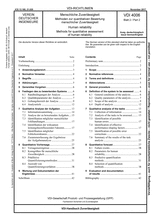Standards Worldwide
Standards Worldwide
Phone +49 30 58885700-07

Technical rule [CURRENT]
VDI 4006 Blatt 2:2017-11
Human reliability - Methods for quantitative assessment of human reliability
- German title
- Menschliche Zuverlässigkeit - Methoden zur quantitativen Bewertung menschlicher Zuverlässigkeit
- Publication date
- 2017-11
- Original language
- German, English
- Pages
- 43
- Publication date
- 2017-11
- Original language
- German, English
- Pages
- 43
Product information on this site:
Quick delivery via download or delivery service
Buy securely with a credit card or pay upon receipt of invoice
All transactions are encrypted
Short description
In all phases of its existence (i.e., in the concept and definition phase, the design and development phase, the production and deployment phase, the use and maintenance phase and the decommissioning phase) human actions contribute to the reliability of the system performance. The required human interventions can lead to errors that are to be assessed and mitigated. The standard provides methods for the quantitative evaluation of human actions. These methods allow assessing the safety and availability of a technical system taking into account human interventions, the extent of human errors in relation to technical errors, as well as determining the most effective ways to increase the safety and reliability taking into account human actions. The standard describes how to proceed in the assessment starting from the definition of the system under assessment. Particular emphasis is placed on the presentation of performing a task analysis and the different methods that can be used for evaluation. Here, two approaches are distinguished: task-related assessment, which depicts the reliability of designed tasks, and situational-related assessment, which depicts the influences of human intentions and goal settings.
Content
ICS
13.180,
21.020
Replacement amendments
This document replaces VDI 4006 Blatt 2:2003-02 .
Also available in
Loading recommended items...
Loading recommended items...
Loading recommended items...
